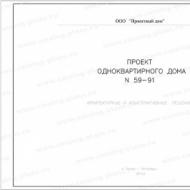
Expenditure obligations stipulated by the law. Types and forms of budget expenditures. Expenditure registers
The budget serves as a source of funds to ensure the payment of expenditure obligations of the relevant public-law entity.
That is, an expenditure obligation is an obligation to pay money from the budget for certain purposes or for certain services.
The main types of expenditure obligations:
Public commitments- the expenditure obligations of a public law formation to an individual or legal entity, to another public law formation stipulated by a law, another regulatory legal act, and subject to execution in the amount established by the relevant law or other regulatory legal act or having the procedure for determining it (calculation , indexing)
Public Regulatory Obligations- public commitments in front of an individual executable in cash in the amount established by the relevant law, other regulatory legal act or having the established procedure for its indexing, with the exception of payments to an individual provided for by the status of state (municipal) employees, as well as persons holding public offices of the Russian Federation (public offices of the constituent entities of the Russian Federation, municipal offices, employees of state institutions, military personnel doing military service by conscription (having the status of military personnel, undergoing military service by conscription), persons studying (pupils) in state (municipal) educational institutions (Article 6 "Concepts and terms used in this Code").
Civil obligations- these are expenditure obligations to an individual, legal entity, other public law entity, a subject of international law, the amount or procedure for calculating which is specified in the agreement (for example, labor), state (municipal) contract. These obligations are enshrined in laws and regulations in the form of powers and functions of government bodies (state institutions), but the scope of obligations is not defined by these laws and regulations. The volume is established through the conclusion of state (municipal) contracts and labor agreements. Requirements for the volume, quality, conditions, procedure and result of the provision of services are formulated in the state (municipal) assignment. For this type of obligations, it is first necessary to determine the possibilities (limits) of their acceptance and fulfillment, i.e. they can and should be limited by budget estimates.
Civil obligations also include all costs that are incurred in order to ensure the provision of public services. For example, repairs, teacher's salary. Its size is indicated in the employment contract, and not in the legal regulation.
State (municipal) services (works)- services (work) provided (performed) in accordance with the state (municipal) assignment by state authorities (local authorities), state institutions, other legal entities (Article 6 "Concepts and terms used in this Code").
State (municipal) task- a document establishing requirements for the composition, quality and (or) volume (content), conditions, procedure and results of the provision of state (municipal) services (Article 6 "Concepts and terms used in this Code").
STAGES OF EXPENDITURE BUDGET EXECUTION (IN PART OF PAYMENTS)
Any expenditure obligation has several "life" stages. These stages, according to the Budget Code, are considered stages of budget execution for expenditures.
Stages of budget execution in terms of expenditures (in terms of payments)(Article 219 of the Budget Code of the Russian Federation "Execution of expenditure budgets):
o Acceptance of budgetary commitments;
o Confirmation of monetary obligations;
o Authorization of payment of monetary obligations;
o Confirmation of fulfillment of monetary obligations.
Budget commitments - expenditure obligations to be fulfilled in the respective financial year (Article 6 "Concepts and terms used in this Code"). Payments for expenditure obligations are planned in the law (decision) on the budget. The expenditure obligation becomes budgetary from January 1, when the budget law comes into force.
1. Acceptance of budgetary commitments:
- The recipient of budgetary funds accepts budgetary obligations by concluding state (municipal) contracts, other agreements with individuals and legal entities, individual entrepreneurs (with the exception of public regulatory obligations) within the limits of the budgetary limits brought to it in the current financial year (current financial year and planned period) obligations - civil obligations;
- The recipient accepts budgetary performance obligations public regulatory obligations after the provision in the law (decision) on the budget, other legal act, the agreement of budgetary appropriations for the fulfillment of budgetary obligations within the limits of the budgetary funds brought to the recipient in the current financial year (current financial year and planning period).
Those. an expenditure obligation turns into an accepted budgetary obligation after the law (decision) on the budget, the consolidated budgetary list provides for funds for its implementation, as well as when the recipient of budgetary funds concludes state (municipal) contracts, other contracts with individuals and legal entities, individual entrepreneurs within the limits of budget obligations in accordance with the budget estimate. The "moment of transformation" depends on the type of expenditure obligation.
Monetary liabilities- the obligation of the recipient of budget funds to pay to the budget, an individual and a legal entity at the expense of the budget, certain funds in accordance with the fulfilled conditions of a civil transaction concluded within the framework of his budgetary powers, or in accordance with the provisions of a law, other legal act, the terms of an agreement or agreement (Article 6 "Concepts and terms used in this Code").
2. Confirmation of monetary obligations- preparation of payment and other documents (execution documents: invoice, etc.) required to authorize their payment, and in cases related to the implementation of operational-search measures, preparation of payment documents.
Those. the budgetary obligation becomes monetary after the recipient of budgetary funds confirms its obligation to pay to the budget, an individual and a legal entity at the expense of the budget, certain funds, in accordance with the fulfilled conditions of a civil law transaction (will sign the execution documents) or in accordance with the provisions law, other legal act, terms of an agreement or agreement. For example, it will make a payment order to pay for services.
3. Authorization of payment of monetary obligations. The compiled p / p should be checked for compliance with the planned indicators, for the presence of money in the accounts, for the legality of the transaction. After all these checks, payments can be authorized for payment, that is, approved by the financial authority or the Federal Treasury (depending on who exercises the authorization authority). An authorization is simply an authorization signature that allows further movement of a document.
- Payment of monetary obligations (with the exception of monetary obligations under public regulatory obligations) is carried out within the limits of budgetary obligations communicated to the recipient of budgetary funds;
- Payment of monetary obligations under public regulatory obligations can be carried out within the limits of budgetary appropriations brought to the attention of the recipient of budgetary funds (i.e. without prior notification of specific recipients of budgetary funds of the limits of budgetary obligations for their adoption, since budgetary allocations for the fulfillment of public regulatory obligations are established directly by law and are enforceable by law).
Payment documents authorized for payment are sent to the bank. Based on these documents, the bank debits money from the single budget account to the recipient's current account.
4. Confirmation of fulfillment of monetary obligations carried out on the basis of payment documents confirming the write-off of funds from the single budget account in favor of individuals or legal entities, the budgets of the budgetary system of the Russian Federation, subjects of international law, as well as verification of other documents confirming the performance of non-monetary transactions to fulfill the monetary obligations of recipients of budget funds.
Figure 3.1. The procedure for executing the budget for expenditures in the context of the main types of expenditure obligations
Payments from the budget are made not only within the framework of budget expenditures, but also within the framework of payments on loans and other attracted sources.
Budget execution by sources of financing the budget deficit (in terms of payments from the budget) carried out by chief administrators, administrators of sources of financing the budget deficit in accordance with the consolidated budget schedule in the manner established by the financial body in accordance with the provisions of the Budget Code. Authorization of payment of monetary obligations to be fulfilled at the expense of budgetary appropriations by sources of financing the budget deficit is carried out in the manner established by the financial body (Article 219.2. Budget execution by sources of financing the budget deficit).
The formation of budget expenditures is carried out in accordance with expenditure obligations, due to the delineation of powers, the execution of which should take place in the next Finn. year at the expense of the respective budgets.
Budget. Costs depending on the eq-th content are divided for 2 types: 1) Capital-budget expenditures, providing innovative and investment activities of the state and municipal. formations. They include: a) expenses resulting in the creation or increase of state or municipal property. B) state investments in existing or newly created legal entities; c) budget loans to legal entities intended for investment purposes; d) expenses for capital repairs. 2) Current expenditures are budget expenditures that ensure the current functioning of state authorities, local governments, budgetary institutions, the provision of state support to other budgets and individual sectors of the economy in the form of grants, subsidies and subventions.
Forms of budget expenditures:
1.allocations for the maintenance of budgetary institutions.
Budgetary institutions have the right to spend money only on: wages of employees; transfer of insurance contributions to the state. Extra-budgetary funds; transfers to the population; travel and other compensation payments to employees; payment of TRU under the concluded state or municipal contracts or in accordance with the approved estimates without the conclusion of state or municipal contracts. Expenditure of budgetary funds in budgetary institutions for other purposes is not allowed.
2. Funds to pay for goods, works and services performed by individuals and legal entities under state or municipal contracts. All purchases of GWS in the amount of more than 2000 minimum wages are carried out exclusively on the basis of state or municipal contracts. The state and municipal contract is an agreement concluded by a state authority or local government, budgetary institutions with physical. And legal. Persons in order to meet state and municipal needs. These contracts are placed on a competitive basis and include a mandatory condition for the payment of a forfeit in case of violation of the terms of the contract. A state or municipal order is a collection of state prisoners. or municipal contracts for the supply of goods, production of work, the provision of services at the expense of the relevant budget. Budget institutions, state and local government bodies that procure GWS in the amount of more than 2000 minimum wages for 1 contract maintain procurement registers, in which d.b. indicated: the name of the purchased TRU, the name and location of the suppliers, the price and date of purchase.
3.Transfers to the population are the budget. Expenditures for financing mandatory payments to the population (pensions, scholarships, benefits, etc.)
4. budget loans to legal entities (including tax credits, deferrals and installments for the payment of taxes and payments and other obligations); 2 types: A) budget loans to legal entities that are not state or municipal unitary enterprises. B) Budget loans by state and municipal unitary enterprises. Wed-va from the return of budget.credits are reflected in the budget expenditures with a minus sign.
5.subventions and subsidies to individuals and legal entities; Subventions are budgetary funds provided to the budget of another level or to a legal entity on a free and non-refundable basis for the implementation of certain goals. A subsidy is a budgetary sr-va provided to the budget of another level, physical. Or a legal entity on the terms of equity financing of targeted expenses. In case of misuse of subsidies and subventions, as well as in case of non-use within the established time frame, they are subject to return to the appropriate budget.
6.investments in the authorized capital of existing or newly created legal entities. Provision of budgetary investments to legal entities that are not state. And munits-mi unitary enterprises, it is possible only under 2 conditions: A) When the right of state. Or municipal ownership of an equivalent part of the Criminal Code of these persons and registration of the participation of the state and municipalities in the Criminal Code of these organizations. B) If there is a feasibility study of the investment project and design estimates.
7. budgetary allocations: A) for the implementation by local governments of mandatory payments to the population established by law; B) implementation of certain state powers transferred to other levels of government; C) compensation for additional costs arising as a result of decisions taken by public authorities, leading to an increase in budget expenditures or a decrease in budget revenues;
8. Interbudgetary transfers;
9. loans to foreign countries;
10. funds for servicing debt obligations, including state or municipal guarantees.
11. Credits and loans within the country at the expense of government-state external borrowings.
In the expenditure part of the budgets of all levels, provision is made for the creation of reserve funds for the executive authorities and local self-government. The creation of reserve funds for legislative bodies is prohibited. The size of the reserve funds of the executive bodies of state power (local administrations) is established by laws (decisions) on the respective budgets and cannot exceed 3% of the total volume of expenditures approved by these laws (decisions).
The funds are used to finance unforeseen expenses, incl. to carry out emergency recovery work and other activities related to the elimination of the consequences of natural disasters and other emergencies
Reserve fund of the President of the Russian Federation: no more than 1% of approved federal budget expenditures; it is not allowed to use it for holding elections, referendums, coverage of the activities of the President of the Russian Federation.
Budget loan
Budget loans to legal entities (including tax credits, deferrals and installments for the payment of taxes and payments and other obligations); 2 types: A) budget loans to legal entities that are not state or municipal unitary enterprises. B) Budget loans by state and municipal unitary enterprises. Wed-va from the return of budget.credits are reflected in the budget expenditures with a minus sign. The difference between 2 types of loans:
Characteristic:
Loan enforcement... A: Provided only on condition of collateral in the form of bank guarantees, surety or pledge of property in the amount of less than 100% of the loan provided. B: No collateral is required
Loan repayment. A: Only on reimbursable terms, B: Both interest rates and interest-free loans are provided
Financial preliminary check... A: Only after a preliminary check of the financial condition. B: The check of the financial state is not performed
The procedure for approving budget loans... A: When approving the budget for the next financial year, indicate the goals for which m. provided a budget loan, conditions, procedure and limits for their provision. B: When approving the budget for the next financial year, conditions and limits for granting a budget loan are indicated
Reporting. A: A report on the provision and repayment of budget loans is attached to the budget execution report. B: Recipients of budget loans are required to provide information and a report on the use of budget loans to the bodies executing the budget
Similar information.
Expenditure obligations should be understood as the obligations arising on the basis of a law, another regulatory legal act, an agreement or an agreement of a public-law entity (of the Russian Federation, a constituent entity of the Russian Federation, a municipal entity) or a budgetary institution acting on its behalf to provide an individual or legal entity, another publicly legal education, a subject of international law funds from the relevant budget.
Expenditure commitments are closely related to budgetary commitments. So, expenditure obligations become budgetary obligations from the date of entry into force of the federal law (decision) on the budget for the next financial year, in which the corresponding expenses are fixed. In other words, budgetary obligations are expenditure obligations legally enshrined in the financial planning act.
Within the framework of expenditure obligations, public and public regulatory obligations are distinguished.
So, public obligations include expenditure obligations of a public law formation to an individual or legal entity, another public law formation, arising on the basis of a law, another regulatory legal act, and subject to execution in the amount established by the relevant law or other regulatory legal act or having the amount established by the specified law. , the act is the order of its determination (calculation, indexing).
In turn, public regulatory obligations are public obligations to an individual subject to execution in monetary form in the amount established by the relevant law, other regulatory legal act, or having the established procedure for indexing it.
At the same time, public regulatory obligations do not include obligations to make payments to an individual provided for by the status of public (municipal) employees, as well as the status of persons holding public offices of the Russian Federation, public offices of the constituent entities of the Russian Federation, municipal offices, employees of budgetary institutions, military personnel. who are doing military service by conscription (having the status of military personnel who are doing military service by conscription), persons studying (pupils) in state (municipal) educational institutions.
For the purpose of proper control over the implementation of expenditure obligations, state and municipal authorities are obliged to maintain registers of expenditure obligations in accordance with the procedure established by the relevant executive body and submit them to a higher executive body.
The register is a list of normative legal acts, municipal legal acts (with the obligatory indication of the relevant articles, parts, clauses, subparagraphs, paragraphs of legal acts) used in drawing up the draft budget, which stipulate public regulatory obligations and (or) legal grounds for other expenditure obligations.
In the register of expenditure obligations, the assessment of the volume of budgetary appropriations necessary for the fulfillment of obligations included in the register is also made.
Depending on the source of funding, there are three types of expenditure obligations:
expenditure obligations of the Russian Federation;
expenditure obligations of the constituent entity of the Russian Federation;
expenditure obligations of the municipality.
So, the expenditure obligations of the Russian Federation include
obligations that are fulfilled at the expense of their own revenues and sources of financing the federal budget deficit.
These expenditure obligations arise on the basis of:
the adoption of federal laws and (or) normative legal acts of the President of the Russian Federation, the Government of the Russian Federation in the exercise by federal bodies of state power of powers on the subjects of jurisdiction of the Russian Federation and (or) powers on matters of joint (representative) and executive bodies of state power of the constituent entities of the Russian Federation ”to the powers of the bodies of state power of the constituent entities of the Russian Federation;
the conclusion by the Russian Federation (on behalf of the Russian Federation) of treaties (agreements) in the exercise by federal bodies of state power of powers on the subjects of jurisdiction of the Russian Federation and (or) powers on subjects of joint jurisdiction not classified in accordance with the Federal Law "On General Principles of Organization of Legislative (representative) and executive bodies of state power of the constituent entities of the Russian Federation ”to the powers of the bodies of state power of the constituent entities of the Russian Federation;
the conclusion on behalf of the Russian Federation of treaties (agreements) by federal budgetary institutions;
the adoption of federal laws and (or) regulatory legal acts of the President of the Russian Federation and the Government of the Russian Federation, providing for the provision of interbudgetary transfers from the federal budget, including:
a) subventions to the budgets of the constituent entities of the Russian Federation for the fulfillment of expenditure obligations of the constituent entities of the Russian Federation in connection with the exercise by the state authorities of the constituent entities of the Russian Federation of certain state powers of the Russian Federation transferred to them;
b) subventions to the budgets of the constituent entities of the Russian Federation for the provision of subventions to local budgets for the fulfillment of expenditure obligations of municipalities in connection with the vesting of local self-government bodies with certain state powers of the Russian Federation.
In turn, the expenditure obligations of the constituent entity of the Russian Federation include obligations that are fulfilled at the expense of their own revenues and sources of covering the budget deficit of the constituent entity of the Russian Federation, as well as funds from territorial extra-budgetary funds.
The grounds for the emergence of these expenditure obligations are:
the adoption of laws and (or) other normative legal acts of the constituent entity of the Russian Federation, as well as the conclusion by the constituent entity of the Russian Federation (on behalf of the constituent entity of the Russian Federation) treaties (agreements) in the exercise by the bodies of state power of the constituent entities of the Russian Federation powers on the subjects of jurisdiction of the constituent entities of the Russian Federation;
adoption of laws and (or) other normative legal acts of the constituent entity of the Russian Federation, as well as the conclusion by the constituent entity of the Russian Federation (on behalf of the constituent entity of the Russian Federation) of treaties (agreements) in the exercise of powers by state authorities of constituent entities of the Russian Federation on matters of joint jurisdiction specified in clause 2 and 5 tbsp. 263 of the Federal Law "On General Principles of Organization of Legislative (Representative) and Executive Bodies of State Power of the Constituent Entities of the Russian Federation";
conclusion on behalf of the constituent entity of the Russian Federation of treaties (agreements) by budgetary institutions of the constituent entity of the Russian Federation;
adoption of laws and (or) other normative legal acts of the constituent entity of the Russian Federation providing for the provision of inter-budgetary transfers from the budget of the constituent entity of the Russian Federation, including subventions to local budgets for the fulfillment of expenditure obligations of municipalities in connection with the vesting of local self-government bodies with certain state powers of the constituent entities of the Russian Federation;
adoption of laws and (or) other normative legal acts of state authorities of the constituent entities of the Russian Federation when the authorities of the constituent entities of the Russian Federation exercise the powers of the Russian Federation transferred to them.
The expenditure obligations of the constituent entity of the Russian Federation are established by the state authorities of the constituent entity of the Russian Federation independently and are fulfilled at the expense of their own revenues and sources of financing the budget deficit of the constituent entity of the Russian Federation.
The only exception is that the expenses associated with the implementation of the powers delegated by the Russian Federation by the constituent entities of the Russian Federation are executed at the expense and within the limits of subventions from the federal budget.
In order to ensure the delimitation of the subjects of jurisdiction and, as a result, expenditure obligations, the BC RF established a ban on the establishment and implementation of expenditure obligations by state authorities of a constituent entity of the Russian Federation related to resolving issues within the competence of federal state authorities, unless otherwise expressly provided for by federal legislation.
At the same time, in order to exclude the establishment of unsecured financial resources of budget expenditures, state authorities of a constituent entity of the Russian Federation have the right to establish and fulfill expenditure obligations related to resolving issues that are not attributed to the competence of federal state authorities, local authorities and are not excluded from the competence of state authorities of the constituent entity. Of the Russian Federation by federal laws or laws of a constituent entity of the Russian Federation, only if there are appropriate funds from the budget of the constituent entity of the Russian Federation.
Expenditure obligations of the municipality are obligations that are fulfilled at the expense of their own revenues and sources of covering the budget deficit of the municipality.
Their occurrence is closely related to the following circumstances:
1) the adoption of municipal legal acts on issues of local importance and other issues that, in accordance with federal laws, are entitled to be decided by local authorities, as well as the conclusion by the municipality (on behalf of the municipality) contracts (agreements) on these issues;
the adoption of municipal legal acts in the exercise of certain state powers delegated to them by local self-government bodies;
conclusion on behalf of the municipality of contracts (agreements) by municipal budgetary institutions.
The expenditure obligations of the municipality are established by the local self-government bodies independently and are fulfilled at the expense of their own revenues and sources of financing the deficit of the corresponding local budget, with the exception of the expenditure obligations assumed and executed in the exercise of certain state powers delegated to them by local self-government bodies. In this case, expenditure obligations are fulfilled at the expense and within the limits of subventions from the budget of the constituent entity of the Russian Federation.
Topic 5. BUDGET EXPENDITURE
5.1. General provisions on budget expenditures
The formation of budget expenditures at all levels of the budgetary system of the Russian Federation is carried out in accordance with the expenditure obligations determined by the delimitation of powers of federal government bodies, government bodies of the constituent entities of the Russian Federation and local government bodies established by the legislation of the Russian Federation, the execution of which, in accordance with the legislation of the Russian Federation, international and other treaties and agreements, must take place in the next financial year at the expense of the respective budgets.
Budget expenditures, depending on their economic content, are divided into current expenditures and capital expenditures.
Capital expenditures budgets - a part of budget expenditures that provides innovation and investment activities, including expenditure items intended for investment in existing or newly created legal entities in accordance with the approved investment program, funds provided as budget loans for investment purposes to legal entities, expenses for capital (restoration) repairs and other expenses associated with expanded reproduction, expenses during which the property is created or increased, which is owned, respectively, by the Russian Federation, constituent entities of the Russian Federation, municipalities, other budget expenses included in the capital expenditures of the budget in accordance with the economic classification expenses of the budgets of the Russian Federation. As part of capital expenditures of budgets, a development budget can be formed.
Running costs budgets - a part of budget expenditures that ensures the current functioning of state authorities, local governments, budgetary institutions, the provision of state support to other budgets and certain sectors of the economy in the form of grants, subsidies and subventions for the current operation, as well as other budget expenditures not included in capital expenses in accordance with the budgetary classification of the Russian Federation.
The provision of budgetary funds is carried out in the following forms:
- appropriations for the maintenance of budgetary institutions;
- funds to pay for goods, works and services performed by individuals and legal entities under state or municipal contracts;
- transfers to the population;
- appropriations for the implementation by local governments of mandatory payments to the population established by the legislation of the Russian Federation, the legislation of the constituent entities of the Russian Federation, legal acts of representative bodies of local government;
- appropriations for the implementation of certain state powers transferred to other levels of government;
- appropriations to compensate for additional costs resulting from decisions taken by public authorities, leading to an increase in budget expenditures or a decrease in budget revenues;
- budget loans to legal entities (including tax credits, deferrals and installments for the payment of taxes and payments and other obligations);
- subventions and subsidies to individuals and legal entities;
- investments in the authorized capital of existing or newly created legal entities;
- interbudgetary transfers;
- loans and borrowings within the country at the expense of government external borrowings;
- loans to foreign countries;
- funds for servicing debt obligations, including state or municipal guarantees.
Budgetary institutions spend budget funds exclusively:
- for wages in accordance with concluded labor contracts and legal acts regulating the amount of wages of the relevant categories of workers;
- transfer of insurance contributions to state extra-budgetary funds;
- transfers to the population, paid in accordance with federal laws, laws of the constituent entities of the Russian Federation and legal acts of local governments;
- travel and other compensation payments to employees in accordance with the legislation of the Russian Federation;
- payment for goods, works and services under the concluded state or municipal contracts.
All purchases of goods, works and services in excess of 2000 minimum wages are carried out exclusively on the basis of state or municipal contracts. Financing of ensuring the placement of an order for the supply of goods, the performance of work, the provision of services for state or municipal needs can be carried out at the expense of funds provided for by the expenditures of the relevant budget or the corresponding budgets of state extra-budgetary funds to meet state needs, or at the expense of funds provided for by the local budget for providing municipal needs.
The costs of financing budget investments are provided for by the relevant budget, subject to their inclusion in the federal target program, regional target program, or in accordance with the decision of the federal executive body, executive body of a constituent entity of the Russian Federation or local government body.
Federal investment objects that provide for expenses in the amount of more than 200,000 minimum wages are subject to review and approval in the manner determined for the financing of federal target programs.
In the expenditure part of the budgets of all levels of the budgetary system of the Russian Federation, it is envisaged to create reserve funds for executive authorities and reserve funds for local governments. In the expenditure side of the budgets of all levels of the budgetary system of the Russian Federation, it is prohibited to create reserve funds for legislative (representative) bodies and deputies of legislative (representative) bodies. The size of the reserve funds in the federal budget may not exceed 3% of the approved federal budget expenditures.
The federal budget for the next financial year provides for the creation of a reserve fund of the President of the Russian Federation in the amount of no more than 1% of the approved federal budget expenditures. The resources of the reserve fund of the President of the Russian Federation are spent on financing unforeseen expenses, as well as additional expenses provided for by decrees of the President of the Russian Federation. The spending of the resources of the reserve fund of the President of the Russian Federation is carried out on the basis of a written order of the President of the Russian Federation.
At the same time, spending the resources of the reserve fund of the President of the Russian Federation for holding elections, referendums, coverage of the activities of the President of the Russian Federation is not allowed.
5.2. Expenditure obligations of the Russian Federation
The federal budget for 2006 provided for expenses in the amount of 4 270 114 718.3 thousand rubles. and income in the amount of 5,046,137,500.0 thousand rubles. based on the projected gross domestic product in the amount of RUB 24,380 billion. and the level of inflation (growth of consumer prices) 7.0-8.5% (December 2006 in relation to December 2005). For 2007, the federal budget planned expenditures in the amount of 5,463,479,900.0 thousand rubles. and income in the amount of 6,965,317,200.0 thousand rubles. based on the projected gross domestic product in the amount of RUB 31,220 billion. and the inflation rate of 6.5–8.0% (December 2007 in relation to December 2006) The expenditure obligations of the Russian Federation arise as a result of:
- the adoption of federal laws and (or) normative legal acts of the President of the Russian Federation and the Government of the Russian Federation in the exercise of powers by the federal bodies of state power on the subjects of jurisdiction of the Russian Federation and (or) joint jurisdiction not attributed to the Federal Law of October 6, 1999 No. 184-FZ " On the general principles of the organization of legislative (representative) and executive bodies of state power of the constituent entities of the Russian Federation "to the powers of the bodies of state power of the constituent entities of the Russian Federation;
- the conclusion by the Russian Federation or on behalf of the Russian Federation of treaties (agreements) in the exercise of powers by federal bodies of state power on the subjects of jurisdiction of the Russian Federation and (or) powers on matters of joint jurisdiction that are not attributed by this Federal Law to the powers of bodies of state power of the constituent entities of the Russian Federation;
- the adoption of federal laws and (or) regulatory legal acts of the President of the Russian Federation and the Government of the Russian Federation, providing for the provision of interbudgetary transfers from the federal budget in the forms and procedure provided for by the BC of the Russian Federation, including:
a) subventions to the budgets of the constituent entities of the Russian Federation for the fulfillment of expenditure obligations of the constituent entities of the Russian Federation in connection with the exercise by the state authorities of the constituent entities of the Russian Federation of powers subject to financial support in accordance with the aforementioned Law at the expense of subventions from the federal budget;
b) subventions to local budgets for the fulfillment of expenditure obligations of municipalities in connection with the vesting of local self-government bodies with certain state powers of the Russian Federation.
Expenditure obligations of the Russian Federation are fulfilled at the expense of its own revenues and sources of covering the federal budget deficit.
In the cases established by federal laws, the expenditure obligations of the Russian Federation are fulfilled at the expense of state extra-budgetary funds.
In 2007, it is planned to accelerate the reimbursement of export VAT and thereby significantly reduce the barrier associated with reimbursement, with a permissive reimbursement procedure, which discourages export operations.
The factors of enhancing economic development undoubtedly include an increase in the investment component in federal target programs, the adoption of a number of new federal target programs.
One of the areas of investment is investment in human capital in the fields of education and healthcare. Without highly qualified personnel with education, at the level of modern requirements, capable of working in conditions of high technologies, innovations in various spheres and sectors of the national economy, it is impossible to create and increase GDP at a high rate. All this creates a new quality of the budget, expands its possibilities as a development budget.
Economic development is also facilitated by additional measures that have begun to be implemented in the social sphere and agriculture. These are four priority national projects: "Affordable and Comfortable Housing", "Health", "Education" and "Development of the Agro-Industrial Complex". National projects are also investments in the economy and in people.
5.3. Expenditure obligations of the constituent entity of the Russian Federation
Expenditure obligations of the constituent entity of the Russian Federation arise as a result of the adoption of:
- laws and other normative legal acts of the constituent entity of the Russian Federation, as well as the conclusion by the constituent entity of the Russian Federation or on behalf of the constituent entity of the Russian Federation treaties (agreements) when the bodies of state power of the constituent entities of the Russian Federation exercise powers on the subjects of jurisdiction of the constituent entities of the Russian Federation;
- laws and other normative legal acts of the constituent entity of the Russian Federation, as well as the conclusion by the constituent entity of the Russian Federation or on behalf of the constituent entity of the Russian Federation of treaties (agreements) when the bodies of state power of the constituent entities of the Russian Federation exercise powers on subjects of joint jurisdiction;
- laws and other regulatory legal acts of the constituent entity of the Russian Federation providing for the provision of inter-budgetary transfers from the budget of the constituent entity of the Russian Federation in the forms and procedures provided for by the BC RF, including subventions to local budgets for the fulfillment of expenditure obligations of municipalities in connection with the vesting of local governments with certain state powers of the constituent entities RF;
- regulatory legal acts of the constituent entity of the Russian Federation in the exercise of powers by the state authorities of the constituent entity of the Russian Federation, which, in accordance with the Federal Law "On the General Principles of Organization of Legislative (Representative) and Executive Bodies of State Power of the Subjects of the Russian Federation", are subject to financial support through subventions from the federal budget.
The expenditure obligations of the constituent entity of the Russian Federation to provide subventions to local budgets for the fulfillment of the expenditure obligations of municipalities in connection with the vesting of local governments with certain state powers of the constituent entities of the Russian Federation are fulfilled by providing local budgets with subventions from the regional compensation fund.
The laws of the constituent entities of the Russian Federation, providing for the provision of subventions to local budgets from the regional compensation fund, should contain the procedure for calculating the standards for determining the total amount of subventions for the fulfillment of the corresponding expenditure obligations of municipalities and shall be annually enacted by the law of the constituent entity of the Russian Federation on the budget of the constituent entity of the Russian Federation for the next financial year, subject to approval by this law, the corresponding subventions to local budgets.
The state authorities of the constituent entity of the Russian Federation independently determine the size and conditions of remuneration for civil servants of the constituent entity of the Russian Federation and employees of state institutions of the constituent entity of the Russian Federation.
The bodies of state power of the constituent entity of the Russian Federation are not entitled to establish and fulfill expenditure obligations related to the solution of issues attributed to the competence of federal bodies of state power, with the exception of cases established by federal laws.
State authorities of a constituent entity of the Russian Federation have the right to establish and fulfill expenditure obligations related to resolving issues that are not attributed to the competence of federal bodies of state power, local authorities and are not excluded from the competence of public authorities of a constituent entity of the Russian Federation by federal laws, laws of a constituent entity of the Russian Federation, only if there are appropriate funds from the budget of the constituent entity of the Russian Federation (excluding grants, subsidies and subventions from the federal budget).
5.4. Expenditure obligations of the municipality
Expenditure obligations of the municipality arise as a result of the adoption of regulatory legal acts of local self-government bodies:
a) on issues of local importance, as well as the conclusion by the municipality or on behalf of the municipality of contracts (agreements) on these issues;
b) in the exercise of certain state powers by local self-government bodies.
The expenditure obligations of the municipality that arose as a result of the adoption of regulatory legal acts of local self-government bodies in the exercise of certain state powers by these bodies in accordance with federal laws (laws of the constituent entity of the Russian Federation) are fulfilled through subventions from the regional compensation fund.
Local self-government bodies independently determine the size and conditions of remuneration for deputies, elected officials of local self-government, exercising their powers on a permanent basis, municipal employees, employees of municipal unitary enterprises and institutions.
In the municipality, which is provided with subsidies from the budget of the constituent entity of the Russian Federation in accordance with paragraph 3 of Art. 138 or subsidies from the budget of the municipal district in accordance with paragraph 4 of Art. 142 of the Budget Code of the Russian Federation, the amount of remuneration for deputies, elected officials of local self-government exercising their powers on a permanent basis, municipal employees, employees of municipal unitary enterprises and institutions is set not higher than the limit values established by the law of the subject of the Russian Federation.
Local government bodies are not entitled to establish and fulfill expenditure obligations related to the solution of issues attributed to the competence of federal government bodies, government bodies of the constituent entities of the Russian Federation, with the exception of cases established, respectively, by federal laws, laws of the constituent entities of the Russian Federation.
Local self-government bodies have the right to establish and fulfill expenditure obligations related to the solution of issues that are not attributed to the competence of local self-government bodies of other municipalities, public authorities, and are not excluded from their competence by federal laws and laws of the constituent entities of the Russian Federation, only if they have their own financial resources ( except for subsidies, subventions and grants provided from the federal budget and the budget of the constituent entity of the Russian Federation).
5.5. Expenditure registers
State authorities and local self-government bodies are obliged to maintain registers of expenditure obligations.
Are you sure you are human?
The register of expenditure obligations is understood as a set (list) of normative legal acts and contracts and agreements (individual articles, clauses, sub-clauses, paragraphs of regulatory legal acts, contracts and agreements) concluded by state authorities (local governments) that provide for the occurrence of expenditure obligations to be fulfilled at the expense of the respective budgets.
The register of expenditure obligations of the Russian Federation is maintained in accordance with the procedure established by the Government of the Russian Federation. The register of expenditure obligations of the constituent entity of the Russian Federation is maintained in the manner established by the executive body of state power of the constituent entity of the Russian Federation.
The register of expenditure obligations of a constituent entity of the Russian Federation, as well as a set of registers of expenditure obligations of municipalities that are part of the constituent entity of the Russian Federation, are submitted to the Ministry of Finance of the Russian Federation in the manner established by this Ministry.
The register of expenditure obligations of the municipality is maintained in the manner prescribed by the local administration. It is submitted by the local government body to the executive body of state power of the constituent entity of the Russian Federation in the manner established by this executive body.
ST 65 BK RF
The formation of the expenditures of the budgets of the budgetary system of the Russian Federation is carried out in accordance with the expenditure obligations stipulated by the delineation of powers of federal bodies of state power, bodies of state power of the constituent entities of the Russian Federation and local self-government bodies established by the legislation of the Russian Federation, the execution of which is in accordance with the legislation of the Russian Federation, international and other treaties and agreements. should take place in the next financial year (the next financial year and the planned period) at the expense of the corresponding budgets.
Commentary on Art. 65 of the Budget Code of the Russian Federation
1. Under the budget expenditures the commented Code understands the funds allocated for the financial support of the tasks and functions of the state and local self-government (see article 6 of the Budget Code of the Russian Federation).
The formation of the expenditure side of budgets is the determination of the directions for the use of budgetary funds by public authorities and local self-government bodies. This process entirely depends on the priority of the tasks solved by the state and local self-government. This dependence is expressed the more clearly, the less financial resources that the state or municipalities are able to dispose of.
Formation of budget expenditures
Therefore, the efficiency of budget expenditures is determined by the correctness of the priorities chosen by the state or municipality in their financial activities.
As follows from part 1 of the commented article, the foundation on which budget expenditures are formed is a unified methodological basis and standards for the minimum budgetary provision of financial costs for the provision of public services and local government services. They are established by the Government of the Russian Federation.
The unified methodological basis for the formation of budget expenditures is the budget classification, which is the same for the budgets of all levels of the budgetary system of the Russian Federation (see Chapter 4 of the commented Code and the commentary to it). It includes three bases for the classification of expenses, in accordance with which the following are distinguished:
- functional classification of expenses;
- economic classification of expenses;
- departmental classification of expenses.
On the basis of a unified budget classification, the Government of the Russian Federation is developing methodological recommendations for the formation of budgets at all levels.
The minimum budgetary provision is the minimum allowable cost of state or municipal services in monetary terms, provided by state authorities or local self-government bodies per capita at the expense of the corresponding budgets. The establishment of standards for the minimum budgetary provision allows the Government of the Russian Federation to ensure the rights of citizens of the Russian Federation in the area of budget expenditures. The norms of the minimum budgetary provision depend on the state minimum social standards established by federal legislation.<*>.
———————————
<*>Currently, the federal law on state minimum social standards has not been adopted. Attempts to adopt similar laws within the constituent entities of the Russian Federation have also not yet achieved their goal.
2. Establishment of state minimum social standards by federal legislation and standards for minimum budgetary provision by the Government of the Russian Federation is intended to consolidate the minimum of services that must be provided by the state and municipalities to every citizen of the Russian Federation. In the presence of sufficient financial capabilities, state authorities of the constituent entities of the Russian Federation and local self-government bodies, taking into account such opportunities, have the right to increase the standards of financial costs for the provision of state and municipal services.
Formation of a register of expenditure obligations by subjects of budget planning in the context of medium-term budgeting
Over the past years, the budgetary system of the Russian Federation has undergone significant changes associated both with the structure of budgetary units and with the organization of the activities of the main administrators of budgetary funds. The main task of reforming the budgetary process at this stage is to increase the level of objectivity and reliability of long-term and short-term forecasting and planning of budget indicators and to create a financial resource management system focused on the final result, i.e. achievement of specific indicators of social and economic development of the state. As one of the main directions of the ongoing transformations, it is necessary to highlight the improvement of the quality of public or budgetary services, the creation of a competitive environment in the market of public services (see figure).
The purpose and objectives of the public sector reforms
——————————————————————¬
¦ Purpose of reforming the system of rendering budgetary services ¦
+—————————————————————-+
¦ Transformation of the "costly mechanism" into a system of efficient ¦
¦ budget services ¦
L ——————————————————————
-¬ -¬ -¬
¦¦ ¦¦ ¦¦
-L / -L / -L /
—————¬ —————¬ —————¬
¦ Task ¦ ¦ Task ¦ ¦ Task ¦
¦ enhancement ¦ ¦ enhancement ¦ ¦ attraction ¦
¦ efficiency ¦ quality ¦ ¦ investment ¦
¦ budgetary ¦ ¦ budgetary ¦ ¦ to the constituent entities of the Russian Federation, ¦
¦ systems ¦ ¦ services ¦ ¦ incl. to the sphere¦
¦ ¦ ¦ ¦ ¦ budget ¦
¦ ¦ ¦ ¦ ¦ service ¦
L ————— L ————— L —————
State authorities have developed Methodological Guidelines for the preparation of registers of expenditure obligations of subjects of budget planning and state extra-budgetary funds of the Russian Federation for 2008-2010, as well as Methodological guidelines for the preparation of justifications for budgetary allocations for 2008-2010. We will comment on the provisions of these practical recommendations for the formation of the register in the context of the types of expenditure obligations, the system of indicators of the effectiveness of budget expenditures, the use of various methods for calculating budget allocations, the composition of the legal grounds for costly areas, as well as substantiating the significance of various factors for changing the needs for budget financing.
In accordance with the recommendations, the subject of budget planning separately compiles a register of expenditure obligations, which does not contain information related to state secrets, and a register of expenditure obligations, containing information related to state secrets.
In the register of expenditure obligations of the subject of budget planning (state non-budgetary fund of the Russian Federation), the following types of expenditure obligations can be distinguished:
- expenditure obligations to ensure state functions of the legislative and judicial authorities;
- expenditure obligations for the provision of public services;
- expenditure obligations for the provision of transfers to the population;
- expenditure obligations for the provision of budgetary investments to legal entities that are not federal state institutions and federal state unitary enterprises;
- expenditure commitments for the provision of interbudgetary transfers;
- expenditure obligations established by interstate (international) treaties and agreements;
- expenditure obligations to service and repay the state debt of the Russian Federation;
- expenditure obligations not classified elsewhere.
An expense obligation is allocated based on the grouping of the section, subsection, target item, and expense type.
In each expenditure obligation for the maintenance of the apparatus of state authorities and subordinate institutions, the following parts of the expenditure obligation are distinguished:
- wages and charges for it;
- purchase of services;
- an increase in the value of fixed assets (with the exception of objects that are financed within the framework of the federal targeted investment program);
- payment of property tax and land tax;
- other expenses related to business support.
In order to compile a register of expenditure obligations, the legal grounds for the occurrence of expenditure obligations for the provision of public services include:
- federal laws and (or) decrees of the Government of the Russian Federation arising from their provisions (including regulatory legal acts on the approval of the regulations on the relevant federal authority, setting the maximum number of civil servants, the list of subordinate budgetary institutions, the maximum number of their employees, etc.);
- federal target programs (subprograms of federal target programs) approved by the Government of the Russian Federation;
- regulatory legal acts (decisions) on the implementation of budgetary investments in objects of federal state property (with the exception of objects of federal target programs);
- federal law on the federal budget (in the part concerning the provision of subventions, subsidies and budget loans to legal entities);
- other regulatory legal acts (decisions) of the President of the Russian Federation and the Government of the Russian Federation.
For the calculation of appropriations, several methods are provided: the standard method, the indexation method, the planned method. Other methods are also possible.
The normative method is understood as the calculation of appropriations based on the standards approved in the relevant regulatory legal act.
An example of expenditure obligations, the volume of which is determined by the normative method, are obligations for remuneration and charges on it.
The indexation method is understood as the calculation of appropriations by indexing to the inflation rate or other coefficient of the amount of appropriations for the current (reporting) year.
An example of expenditure obligations, the volume of which is determined by the indexation method, are expenditure obligations to pay for transport, utilities, purchase of communication services, etc.
The planned method is understood as the establishment of the amount of appropriations in accordance with the indicators specified in the regulatory legal act (agreement, passport of the federal target program, loan conditions), or in accordance with the estimated cost of the object.
An example of expenditure obligations, the volume of which is determined by the planning method, are expenditure obligations to repay the state debt of the Russian Federation.
Other methods are understood to mean the determination of the amount of appropriations by methods that do not fall under the definitions of the normative method, the indexing method and the planned method.
Simultaneously with the register of expenditure obligations, an explanatory note should be submitted, in which, for each expenditure obligation included in the register of expenditure obligations, the following are given:
- a complete list of legal acts that are the basis for the emergence of an expenditure obligation;
- a reference to the provisions of federal laws (with an extract) establishing the powers of federal bodies of state power (issues of jurisdiction of the Russian Federation), in accordance with which the corresponding normative legal acts were adopted, if the basis in the register is not a federal law;
- a description of the methods for calculating the amount of appropriations for the fulfillment of the expenditure obligation for the next financial year and the planning period (indicating the corresponding formulas and sources used in the calculations of the initial data).
The position of the developers of the methodological provisions regarding the justification of the needs for budgetary funds is that the justification of budgetary allocations is an integral part of the draft budget of the Russian Federation for the medium term.
The rationale for budget allocations is formed as a document that presents the characteristics of changes and the results of the use of budget allocations in two forms, one of which reflects the main factors of changes in the maximum expenditure volumes of the main administrators of budget funds, and the other - the results of the use of budget allocations. Form No. 1 of the justification of budgetary appropriations is submitted as a whole for each main manager of budget funds.
The rationale provides the distribution of the change in the volume of funding by nine possible factors:
- changes in the rates (conditions) of remuneration (pay);
- changes in the number of public sector employees (civil servants, service personnel, involved persons, military personnel and persons equated to them);
- changes in the number of persons receiving transfers;
- changes in the amount of transfers to the population per recipient;
- changes in prices (tariffs) for goods, works, services;
- changes in the physical volumes of the purchase of goods (works, services) for state needs;
- changes in the amount of funding, termination or beginning of the implementation of the target program;
- changes in the volume of budget investments not included in targeted programs;
- other reasons.
In this case, it is necessary to provide an explanation detailing the content of the changes that have occurred, a reference to the legal act (decision), which is the basis for these changes, as well as the calculation of the amount of change in the volume of expenses.
The second form of justification should indicate the quantitative or qualitative characteristics of the results of the use of budgetary appropriations for each type of expenditure. The result of using budgetary appropriations is understood as the volume and quality of public services provided by the main manager and his subordinate administrators and recipients of federal budget funds to external consumers (legal entities and individuals, government bodies), the volume or number of government functions performed, activities carried out.
For example, a qualitative description of the results of spending funds in the direction of "Conducting R&D for State Needs" is interpreted as follows: the number of implemented R&D, the number of patents obtained, the number of new diagnostic tools and vaccines developed.
For the types of expenditures for which transfers are made to the population, it is recommended to use the indicator "number of recipients of transfers" as an indicator of immediate results.
Analyzing the recommendations of the Ministry of Finance of Russia, it is necessary to emphasize a number of positive proposals, the introduction of which into the practice of the budgetary process will increase the efficiency of spending public funds, but at the same time highlight possible approaches to their detailing.
Administrators and budget recipients will have to reflect in the register of expenditure obligations qualitative and quantitative indicators of the results of spending budget funds, which is a direct characteristic of performance-based budgeting. However, performance indicators can be relative, reflecting cost effectiveness.
Organization of the formation of budget expenditures 1 Expenditure obligations 2
For example, the estimated result of actions for the improvement of territories can be the cost of improvement per 1% of the number of residents who are not satisfied with the quality of services.
The possibility of using other, more complex, methods of calculating appropriations, of course, will be in demand due to the need to match the approaches to determining the needs for funds with improved methods and tools for organizing the budget process, new stages in the development of budget and tax systems.
Simultaneously with the introduction of register forms of using the expenditure side of budgets at the federal level, a similar introduction of such a consolidated document should take place in the activities of administrators and budget recipients in the constituent entities of the Russian Federation and municipalities, which seems to be an even more difficult task. In addition to the problems of reducing the tax independence of the budgets of the constituent entities of the Russian Federation and municipalities, the ineffective use of municipal property, the lack of infrastructure for financial markets, there is also the problem of preparing and introducing new comprehensive methodological and methodological approaches to planning and executing budgets. We also emphasize that the successful implementation of transformations in the field of budgetary services is determined, first of all, by the level of responsibility of administrators of budgetary funds both for the resources used and for the results achieved; regular monitoring of the provision of budgetary services and assessment of the opinions of their consumers are also required.
E. V. Borovikova
Department of Taxes and Taxation
All-Russian state
Tax Academy of the Ministry of Finance of Russia
Budget expenditures- monetary funds provided from the budget for the implementation of the functions and tasks assigned to them by state and local authorities.
The main purpose of budget expenditures is manifested in the use of budgetary funds by public authorities and local self-government bodies in the course of their activities to manage zhonomics, regulate the social sphere, stimulate scientific and technological progress, ensure defense capability and law and order in the state, etc.
The amount and structure of budget expenditures is influenced by the volume of gross domestic product as the main source of state and municipal financial resources; features of the historical development of the state (for example, during periods of hostilities, it becomes necessary to increase the volume of budgetary resources allocated for military purposes); socio-economic tasks (for example, the judicial reform being carried out in the Russian Federation was accompanied by an increase in budgetary expenditures on the judiciary due to an increase in the number of judges, an expansion of the composition of judicial sections, an increase in the official salaries of judges and employees of the court apparatus, etc.); functions performed by state and local government bodies.
The formation of budget expenditures is carried out in accordance with the expenditure obligations of public law entities (the Russian Federation, constituent entities of the Russian Federation, municipalities).
Expenditure Obligations of a Public Law Entity- this is the obligation of a public law entity or a budgetary institution acting on its behalf to provide a legal or natural person, another public law entity with the funds of the corresponding budget... The expenditure obligations of the Russian Federation are enshrined in federal laws, regulatory legal acts of the President of the Russian Federation and the Government of the Russian Federation, as well as agreements concluded by the Russian Federation (or on behalf of the Russian Federation). The expenditure obligations of the constituent entities of the Russian Federation are established in the laws and other regulatory legal acts of the constituent entities of the Russian Federation, as well as in agreements concluded by the constituent entities of the Russian Federation (or on behalf of the constituent entities of the Russian Federation). The expenditure obligations of municipalities are enshrined in municipal legal acts, as well as in contracts concluded by municipalities (or on behalf of municipalities).
When establishing expenditure obligations, normative regulation of the content and form of the corresponding budget expenditures is provided. Expenditure obligations are the link between the right of a citizen, a business entity and a public law entity to receive budgetary funds and the obligation of state and local authorities to provide budget funds. Expenditure obligations are a tool for assessing the completeness and validity of budgetary expenditures.
Depending on the content of expenditure obligations, they include expenditure obligations for the provision of state and local government bodies, as well as state and municipal institutions of state and municipal services; provision of interbudgetary transfers; implementation of budgetary investments; servicing state and municipal debt. A special position in the composition of expenditure obligations is occupied by public regulatory obligations that provide for the provision of budgetary funds to citizens within the framework of their social security.
In the structure of expenditure obligations fulfilled at the expense of the federal budget and the budgets of the constituent entities of the Russian Federation, expenditure obligations for the provision of public services and the provision of interbudgetary transfers prevail. The main volume of funds from local budgets is directed to the fulfillment of expenditure obligations for the provision of municipal services.
For the fulfillment of expenditure obligations in full, it is envisaged to divide them into valid and accepted ones. Existing expenditure obligations are unchanged during a specific financial period (current financial year, next financial year, planning period). Their implementation does not provide for a reduction or increase in budget expenditures. Expenditure commitments expected to be taken over or increased in a given financial period relate to assumed expenditure obligations... Acceptance of new expenditure commitments is allowed provided that the existing expenditure commitments are secured.
Unconditional fulfillment of existing expenditure obligations is one of the tasks of the budgetary policy of the Russian Federation at the present stage. In the Budget Message of the President of the Russian Federation to the Federal Assembly of the Russian Federation of 06/23/2008 "On budgetary policy in 2009-2011" it was indicated that decisions to increase or establish new spending obligations should be made only within the limits of the financial resources available for their implementation.
In accordance with the principle of autonomy of budgets established in the Budget Code of the Russian Federation (Articles 28 and 31 of the Budget Code of the Russian Federation), state authorities of the Russian Federation, constituent entities of the Russian Federation and local governments independently determine the directions of spending the funds of the respective budgets. The variety of types of budget expenditures provides for the need to group them according to functional and economic purpose, as well as departmental affiliation.
Functional composition of expenses reflects the distribution of budgetary funds in the main areas of activity of state authorities and local self-government in various spheres of society:
Implementation of lawmaking, judicial, managerial and law enforcement activities;
Implementation of the social rights of citizens established by the Constitution of the Russian Federation, including the right to education, health care and medical assistance, social security, protection of motherhood and childhood, to housing;
Ensuring the internal and external security of the state and international cooperation;
State regulation and stimulation of the economy, scientific and technological progress;
Formation of state (municipal) reserves and reserves;
State (municipal) debt management, etc.
The functional grouping of expenses allows us to reveal the role of the state in managing the economy and social sphere of society. This grouping is reflected in the classification of budget expenditures, which is part of the budget classification of the Russian Federation.
At the expense of the federal budget, the implementation of the powers of the state authorities of the Russian Federation on the subjects of the jurisdiction of the Russian Federation and the joint jurisdiction of the Russian Federation and the constituent entities of the Russian Federation is ensured. Funds from the budget of the constituent entities of the Russian Federation are used to finance the powers of the state authorities of the constituent entities of the Russian Federation outside the jurisdiction of the Russian Federation and the powers of the federal bodies of state power in matters of joint jurisdiction of the Russian Federation and the constituent entities of the Russian Federation. Local budgets ensure the implementation of the powers of local self-government bodies to resolve issues of local importance.
In other words, the principle of delimiting the subjects of jurisdiction and powers between the state authorities of the Russian Federation and the state authorities of the constituent entities of the Russian Federation, established in Art. 5 of the Constitution of the Russian Federation, as well as the independence of local self-government, guaranteed in Art. 12 and 130 of the Constitution of the Russian Federation, underlie the delineation of expenditure powers 1 between the levels of government in the Russian Federation. The main task of such distinctions is to secure the rights and obligations for the use of budgetary funds in an amount sufficient for the implementation of the assigned functions and tasks to the state authorities of various levels and local self-government bodies. The volume of expenditure powers assigned to a public authority or local self-government body must correspond to the volume of financial resources at its disposal.
The distribution of budget expenditures by the levels of the budgetary system of the Russian Federation has developed as follows (Table 12.1).
Table 12.1 Distribution of main types of expenses by levels of the budgetary system of the Russian Federation in 2008

A source. Calculated on the basis of the Report on the execution of the consolidated budget of the Russian Federation and the budgets of state extra-budgetary funds as of January 1, 2009 and the Report on the execution of the consolidated budgets of the constituent entities of the Russian Federation and the budgets of territorial state extra-budgetary funds as of January 1, 2009.
Thus, funds from budgets of all levels of the RF budgetary system are attracted for the main areas of expenditure.
From federal budget
the following types of expenses are financed: activities of the President of the Russian Federation, federal legislative and executive bodies; the functioning of the federal judicial system; international activity (implementation of interstate agreements); national defense (maintenance of the RF Armed Forces); law enforcement and state security (maintenance of institutions of the penitentiary system, activities of customs authorities, maintenance of prosecutors, activities of border service bodies, provision of state security bodies); fundamental research and promotion of scientific and technological progress; exploration and use of outer space; state support for nuclear energy; government support for rail, air and sea transport; activities of federal institutions of education, health care, culture and art; social protection of certain categories of citizens (victims of radiation accidents,
veterans, etc.), the activities of the mass media of the Russian Federation; prevention and elimination of the consequences of emergency situations and natural disasters on a federal scale; servicing the state debt of the Russian Federation; replenishment of state reserves and reserves; holding elections and referendums of the Russian Federation; provision of interbudgetary transfers to other budgets of the budgetary system of the Russian Federation.
The distribution of federal budget expenditures in the main areas of their functional grouping is presented in table. 12.2.
Table 12.2 Structure of federal budget expenditures in 2008

A source. Calculated based on Console Performance Reportthe allocated budget of the Russian Federation and the budgets of state extra-budgetaryfunds as of January 1, 2009
Thus, the bulk of federal budget expenditures falls on interbudgetary transfers to other budgets of the budgetary system of the Russian Federation, as well as to support the activities of federal government bodies. In 2009, the priority areas for spending federal budget funds did not change significantly. These are inter-budgetary transfers to other budgets of the budgetary system of the Russian Federation, national issues, ensuring law enforcement and national security. In order to implement the measures provided for by the Program of Anti-Crisis Measures of the Government of the Russian Federation, in 2009 it is envisaged to increase the federal budget expenditures to support the financial market, labor market and economic sectors, as well as social security of the population.
The priority directions of federal budget expenditures are annually formulated in the Budget Address of the President of the Russian Federation to the Federal Assembly of the Russian Federation and are reflected in the main directions of the budgetary and tax policy of the Russian Federation.
From budgets of the constituent entities of the Russian Federation the following types of expenditures are financed: activities of legislative and executive authorities of the constituent entities of the Russian Federation; maintenance of justices of the peace and the courts of the constituent entities of the Russian Federation; organization of service to the population by suburban and intermunicipal transport; support for agricultural production, small and medium-sized businesses; maintenance of state institutions of education, health care, culture and art by a constituent entity of the Russian Federation; activities of the mass media of the constituent entities of the Russian Federation; ensuring youth policy; social support and social services for certain categories of citizens; prevention and elimination of the consequences of emergency situations and natural disasters of a regional scale; servicing the state debt of the constituent entities of the Russian Federation; holding elections and referendums of the constituent entities of the Russian Federation; provision of interbudgetary transfers to the budgets of municipalities.
The distribution of expenses of the budgets of the constituent entities of the Russian Federation is presented in table. 12.3.
Table 12.3 The structure of expenditures of the budgets of the constituent entities of the Russian Federation in 2008

A source. Calculated on the basis of the Report on the execution of the consolidated budgets of the constituent entities of the Russian Federation and the budgets of territorial state extra-budgetary funds as of January 1, 2009.
Thus, a priority place in the structure of expenditures of the budgets of the constituent entities of the Russian Federation belongs to the expenditures for the provision of interbudgetary transfers to the budgets of municipalities, as well as state support for certain sectors of the regional economy.
Composition of expenditures of local budgets close to the spheres of activity that ensure the satisfaction of the needs of citizens associated with their residence in the territory of this municipality. At the expense of local budgets are financed: activities of local self-government bodies; the functioning of municipal bodies for the protection of public order; maintenance of the municipal housing stock, landscaping and landscaping of the territory of municipalities and other measures in the field of housing and communal services; municipal road construction and maintenance of local roads; organization of transport services for the population within municipalities; activities of municipal institutions of education, health care, culture, physical culture and sports; activities of the mass media of municipalities; prevention and elimination of the consequences of emergencies and natural disasters on a local scale; organization of environmental protection on the territory of municipalities; municipal debt service; holding municipal elections and local referendums.
The structure of expenditures of local budgets is shown in table. 12.4.
Table 12.4 Structure of expenditures of local budgets in 2008

A source. Calculated on the basis of the Consolidation Performance Reportbathroom budgets of constituent entities of the Russian Federation and budgets of territorial stateextrabudgetary funds as of January 1, 2009
Thus, the main budgetary resources of local governments are concentrated on financing housing and communal services, preschool and general education.
In the expenditure side of the budgets of all levels of the budgetary system of the Russian Federation, the formation of reserve funds of executive bodies of state power and local administrations may be envisaged.
Reserve funds of executive bodies of state power and local administrations represent a separate part of budgetary funds at the disposal of the executive bodies of state power and local administrations and intended to finance unforeseen expenses... The formation of reserve funds of legislative (representative) bodies is prohibited.
Traditionally, the formation of reserve funds is associated with the need to finance the costs of emergency rescue, recovery and other types of work caused by emergencies and natural disasters. Meanwhile, the content of unforeseen expenses is not limited to their emergency nature, it is planned to finance various activities that are not foreseen for the current financial year. In other words, at the expense of the reserve funds of the executive bodies of state power and local administrations, funding is provided for expenses not provided for by the Federal Law (decision) on the budget and determined by decisions of executive bodies and local administrations.
In the federal budget, the Reserve Fund of the President of the Russian Federation and the Reserve Fund of the Government of the Russian Federation, the Reserve Fund of the Government of the Russian Federation for the prevention and elimination of emergencies and the consequences of natural disasters are formed. The total size of the reserve funds of the executive bodies of state power and local administrations may not exceed 3% of the approved expenditures of the corresponding budget. The reserve fund of the President of the Russian Federation is approved in the amount of no more than 1% of the federal budget expenditures. The specific size of the funds is established annually when the law (decision) on the budget is approved 2.
Following the principles of targeting and targeted nature of budget funds, the jurisdiction of budget expenditures, the functional grouping of expenditures is complemented by their departmental distribution. The departmental structure of expenditures provides for the distribution of budgetary funds between state bodies, local self-government bodies, the most significant institutions of the social sphere 3 at the disposal of which they are provided, with the subsequent grouping of expenses depending on their functional purpose.
Thus, the departmental structure of expenditures makes it possible to disclose the composition of state bodies, local self-government bodies, individual state and municipal institutions carrying out expenses of one functional purpose, as well as the functional composition of expenses carried out by a state body, local self-government body, state and municipal institution. State bodies, local self-government bodies, state and municipal institutions indicated in the departmental structure of expenditures have the powers of the main managers of the funds of the corresponding budget.
Budget expenditures in their functional and departmental structure are approved by the federal law (decision) on the budget and the law (decision) on budget execution.
When drawing up and approving the budget for the medium-term period (the next financial year and the planning period), conditionally approved expenses are allocated in the departmental structure of expenses, i.e. costs not allocated to functional areas. They are established exclusively for the upcoming (planned) financial period and at the same time perform the function of conditional reserving of budget funds for the fulfillment of the assumed expenditure obligations. The volume of imputed expenditures reflects the possibility of accepting new or increasing existing expenditure commitments in the coming financial period. The amount of the conditionally approved expenditures cannot exceed 2.5% of the total budget expenditures for the first year of the planning period and 5% for the second year of the planning period.
Economic grouping of budget expenditures involves the distribution of budgetary funds depending on the goals and conditions of their allocation. Its use provides opportunities for including budget expenditures in the calculations of gross domestic product and gross regional product, for analyzing the impact of budget expenditures on the structure of public consumption and accumulation. The economic grouping of expenditures is basic in assessing the targeted use of budget funds.
The economic grouping of expenditures is reflected in the classification of operations of the general government sector, which is part of the budget classification of the Russian Federation.
Within the framework of this grouping, the following types of expenses are distinguished: for wages and charges for wages of employees of budgetary institutions, pay for state and municipal employees; to pay for works and services rendered to budgetary institutions; for the payment of social benefits (compensations, subsidies) to certain categories of citizens; for gratuitous transfers to commercial and non-commercial organizations, as well as other budgets of the budgetary system of the Russian Federation and subjects of international law; to service state and municipal debt; for construction, acquisition of fixed assets in state and municipal ownership, as well as reconstruction, technical re-equipment of fixed assets in state and municipal ownership. They are carried out in various forms presented in table. 12.5. Budget expenditures in their economic structure are not approved by the Federal Law (decision) on the budget.
Table 12.5 Main forms of budget expenditures



* Expenses for state (municipal) support of non-profitorganizations that are not budgetary or autonomous,are carried out in forms similar to expenditures for the state (municipalfull) support of commercial organizations.
*
*
Definition of subventions as a form of government spending(municipal) support for public entities is conditional.The subvention is provided for the fulfillment of expenditure obligations related tocarried out by public authorities and local selfmanagement of delegated powers, while subsidies and inter-budgetnaya subsidy ensure the fulfillment of expenditure obligations,during the implementation by public authorities and localself-government of their own powers.
Improving the forms of budget expenditures is one of the directions of modern budgetary policy in the Russian Federation. Changes in the budgetary financing of commercial organizations provide for an expansion of the competitive basis for the distribution of budgetary resources, an increase in the responsibility of business entities for the efficiency and effectiveness of the use of funds. The conditions of budget subsidies for commercial organizations suggest the possibility
reduction of subsidies to organizations whose indicators of the effectiveness of the use of budgetary funds have not reached the specified values.
Transformations in the financial support of state and municipal institutions are associated with the use of state and municipal assignments and the transition to the mechanism of normative per capita financing. State n
municipal assignments are an instrument of legal regulation of requirements for the volume, quality, conditions and procedure for the provision of state and municipal services. The provision of budgetary funds to state and municipal institutions is carried out taking into account the assessment of the fulfillment of the state and municipal tasks. The transition to normative per capita financing provides for the reimbursement of the institution of costs for the provision of state and municipal services based on their normative assessment per consumer. The amount of budgetary funds allocated for the provision of state and municipal services is determined based on the established norm of per capita financing and the number of consumers of state and municipal services in accordance with the state and municipal assignments.
The process of reforming the system of social payments is associated with the use of targeted forms of social support for the population, as well as the use of additional cash payments for the special working conditions of certain categories of workers (in particular, military personnel and persons equated to them).
1 Expenditure powers are the rights and obligations of state and local authorities to spend budget funds within their competence.
2 In 2008, the volume of the reserve funds of the President of the Russian Federation and the Government of the Russian Federation did not exceed 0.08% of the federal budget expenditures, the volume of the reserve funds of the executive authorities of the constituent entities of the Russian Federation and local administrations - 0.01%, respectively, of the budgets of the constituent entities of the Russian Federation and local budgets.
3 For example, the departmental structure of federal budget expenditures provides for the distribution of funds not only between the state bodies of the Russian Federation, but also between individual federal state institutions - the State Academic Bolshoi Theater of Russia, the State Hermitage Federal State Institution, and the Moscow State University. M.V. Lomonosov "and others.
(Materials are given on the basis of: A.G. Gryaznov. E.V. Markina Finance. Textbook. 2nd ed. - M.: Finance and statistics, 2012)















